 W
WThe Beyond the Red trilogy is a series of young adult dystopian science fiction novels by Gabe Cole Novoa, writing under the pen name Ava Jae. Set on a planet where humans and a humanoid native species are in violent conflict, the books include action, forbidden romance, political intrigue, and queer themes.
 W
WThe Book of the Short Sun (1999–2001) is a series of three science fantasy novels or one three-volume novel by the American author Gene Wolfe. It continues The Book of the Long Sun (1993–1996): they share a narrator and Short Sun recounts a search for Silk, the Long Sun hero. The two works are set in the same universe as The Book of the New Sun series that Wolfe inaugurated in 1980 and the Internet Speculative Fiction Database (ISFDB) catalogs all three as sub-series of the "Solar Cycle", along with some other writings.
 W
WThe Caretaker Trilogy is a series of science fiction thrillers with an ecological theme, written for young adults by David Klass. The first book in the series, Firestorm (2006), was the first book ever endorsed by Greenpeace and was praised by critics for its combination of entertainment value and environmental message, garnering an American Library Association (ALA) Best Book citation, a starred review from Publishers Weekly, and a favorable review by the New York Times Book Review. The story focuses on Jack Danielson, a teenager sent back from the future to save the world’s oceans. Whirlwind, the second book in the Caretaker Trilogy, tells the story of Jack’s efforts to save the Amazon rain forest; published in March 2008 by Farrar, Straus and Giroux. The third book in the trilogy is Timelock, published in 2009.
 W
WChaos Walking is a young adult science fiction series written by American-British novelist Patrick Ness. It is set in a dystopian world where all living creatures can hear each other's thoughts in a stream of images, words, and sounds called Noise. The series is named after a line in the first book: "The Noise is a man unfiltered, and without a filter, a man is just chaos walking." The series consists of a trilogy of novels and three short stories.
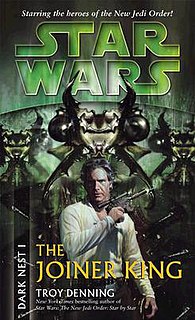 W
WThe Dark Nest trilogy is a trilogy of science fiction novels set in the Star Wars galaxy 35–36 years ABY. The series serves as a follow up to the events of the New Jedi Order series of novels, and a precursor to the Legacy of the Force and Fate of the Jedi series of novels. The trilogy was written by Troy Denning. The first installment was released in July 2005 and the final installment was released in December of that same year. This series features heroes of the New Jedi Order.
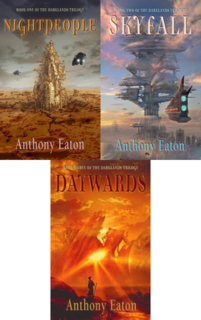 W
WThe Darklands trilogy is a series of books by Australian author Anthony Eaton. University of Queensland Press published all three books. The series is set over 1000 years in a future in which the human race has polluted the world and now, in part, living in sealed environments and part in an exposed but walled wasteland known as the Darklands. The books centre on Saria, a darklander (Nightpeople), Larinan Mann of Port City (Skyfall), and Dara, Saria's granddaughter (Daywards).
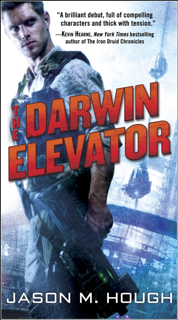 W
WThe Dire Earth Cycle is a trilogy of science fiction novels written by American author Jason M. Hough. The series was simultaneously released in both the United States and the United Kingdom. The first book in the series, The Darwin Elevator, was released in July 2013, and the two sequels, The Exodus Towers and The Plague Forge, were released later that same year. An eBook-only release, The Dire Earth: A Novella, acts as a prequel to the trilogy and reveals more of the main characters' backgrounds.
 W
WThe Divergent trilogy is a series of young adult science fiction adventure novels by American novelist Veronica Roth set in a post-apocalyptic dystopian Chicago. The trilogy consists of Divergent (2011), Insurgent (2012) and Allegiant (2013). A related book, Four (2014), presents a series of short stories told from the perspective of one of the trilogy's characters, the male love interest Four. A later short story, We Can Be Mended (2018), serves as an epilogue five years after the events of the trilogy, again from Four's perspective.
 W
WThe Foundation series is a science fiction book series written by American author Isaac Asimov. First published as a series of short stories in 1942–50, and subsequently in three collections in 1951–53, for thirty years the series was a trilogy: Foundation, Foundation and Empire, and Second Foundation. It won the one-time Hugo Award for "Best All-Time Series" in 1966. Asimov began adding new volumes in 1981, with two sequels: Foundation's Edge and Foundation and Earth, and two prequels: Prelude to Foundation and Forward the Foundation. The additions made reference to events in Asimov's Robot and Empire series, indicating that they were also set in the same fictional universe.
 W
WThe Gaea Trilogy consists of three science fiction novels by John Varley. The stories tell of humanity's encounter with a living being in the shape of a 1,300 km diameter Stanford torus, inhabited by many different species, most notably the centaur-like Titanides, in orbit around the planet Saturn.
 W
WThe Han Solo Adventures is a trilogy of novels set in the Star Wars fictional universe by American science-fiction novelist Brian Daley. It follows the smuggling days of Han Solo and Chewbacca ten years before the events of the original Star Wars film. The books were released in 1979–1980, making them the first non-movie Star Wars books published, except for Splinter of the Mind's Eye (1978). They were also the last published until The Adventures of Lando Calrissian trilogy in 1983; both trilogies were originally published by Del Rey, a division of Ballantine Books. The three Han Solo books were also published as an omnibus edition in 1992.
 W
WThe Hunger Games is a series of young adult dystopian novels written by American novelist Suzanne Collins. The series is set in The Hunger Games universe, and follows young Katniss Everdeen.
 W
WThe Illuminatus! Trilogy is a series of three novels by American writers Robert Shea and Robert Anton Wilson, first published in 1975. The trilogy is a satirical, postmodern, science fiction-influenced adventure story; a drug-, sex-, and magic-laden trek through a number of conspiracy theories, both historical and imaginary, related to the authors' version of the Illuminati. The narrative often switches between third- and first-person perspectives in a nonlinear narrative. It is thematically dense, covering topics like counterculture, numerology, and Discordianism.
 W
WLilith's Brood is a collection of three works by Octavia E. Butler. The three volumes of this science fiction series were previously collected in the now out of print volume, Xenogenesis. The collection was first published under the current title of Lilith's Brood in 2000.
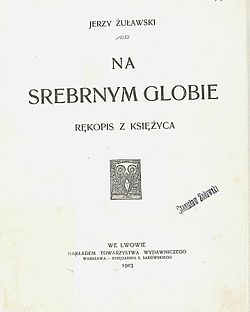 W
WTrylogia Księżycowa is a trilogy of science fiction novels by the Polish writer Jerzy Żuławski, written between 1901 and 1911. It has been translated into Russian, Czech, German and Hungarian, and has been reprinted several times in Poland. They are his best-known works.
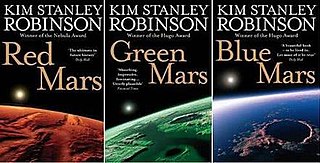 W
WThe Mars trilogy is a series of science fiction novels by Kim Stanley Robinson that chronicles the settlement and terraforming of the planet Mars through the personal and detailed viewpoints of a wide variety of characters spanning almost two centuries. Ultimately more utopian than dystopian, the story focuses on egalitarian, sociological, and scientific advances made on Mars, while Earth suffers from overpopulation and ecological disaster.
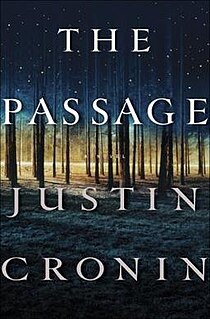 W
WThe Passage is a novel series by Justin Cronin. There are three published books in the series. The film rights were acquired by Fox Entertainment Group in 2007 for adaptation into a film trilogy, but after 12 years of development and planning, it was changed to a television series, which premiered in January 2019 and was canceled after the first season.
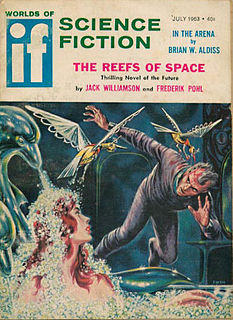 W
WThe Starchild Trilogy is a series of three books written by Frederik Pohl and Jack Williamson. In the future depicted in this series, mankind is ruled by a brutal totalitarian government known as the Plan of Man, enforced by a computerized surveillance state.
 W
WThe T2 trilogy is a series of novels written by S. M. Stirling, set after the events of Terminator 2: Judgment Day, and first published in May 2001, which makes them the first works to officially continue the franchise. The series consists of three novels: T2: Infiltrator (2001), T2: Rising Storm (2003), and T2: The Future War (2004).
 W
WThe Flight Engineer is a trilogy of science fiction novels, which can be defined as space opera, by S. M. Stirling and James Doohan and published by Baen Books. It consists of The Rising, The Privateer (1999) and The Independent Command (2000).
 W
WThe Reefs of Space is a dystopian science fiction novel written by Frederik Pohl and Jack Williamson in 1964. It is part of the Starchild Trilogy, a series of three books in which mankind is ruled by a brutal totalitarian government known as the Plan of Man, enforced by a computerized surveillance state. The other books in the series are Starchild (1965) and Rogue Star (1969).
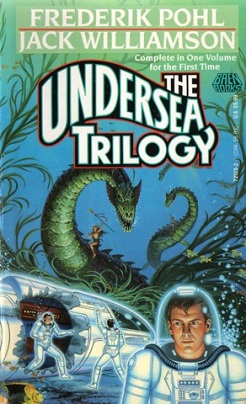 W
WThe Undersea Trilogy is a series of three science fiction novels by American writers Frederik Pohl and Jack Williamson. The novels were first published by Gnome Press beginning in 1954. The novels were collected in a single omnibus volume published by Baen Books in 1992. The story takes place in and around the underwater dome city called Marinia. The hero of the stories is cadet Jim Eden of the Sub-Sea Academy.
 W
WThe Wayward Pines Trilogy (2012–2014) is a mystery/thriller/science fiction novel series by American author Blake Crouch. It follows U.S. Secret Service agent Ethan Burke as he unravels the mystery surrounding his unanticipated arrival in the small town of Wayward Pines, Idaho following a devastating car accident. The novels are Pines (2012), Wayward (2013), and The Last Town (2014). In 2015, the novels were adapted into the television series Wayward Pines.